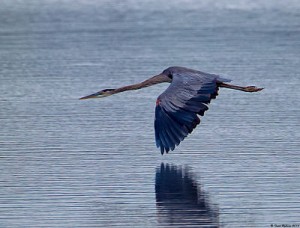 There is a great tradition of poetry that elevates the experience of the natural world to provide a feeling of deep connection to the cycle of life and death. I can think of no better example of this type of poetry than can be found in the early work of Mary Oliver. Here’s one. (This poem’s lines are centered on the page in the original, but WordPress won’t do that):
There is a great tradition of poetry that elevates the experience of the natural world to provide a feeling of deep connection to the cycle of life and death. I can think of no better example of this type of poetry than can be found in the early work of Mary Oliver. Here’s one. (This poem’s lines are centered on the page in the original, but WordPress won’t do that):
 Heron Rises from the Dark, Summer Pond
Heron Rises from the Dark, Summer Pond
So heavy
is the long-necked, long-bodied heron,
always it is a surprise
when her smoke-colored wings
open
and she turns
from the thick water,
from the black sticks
of the summer pond,
and slowly
rises into the air
and is gone.
Then, not for the first or the last time,
I take the deep breath
of happiness, and I think
how unlikely it is
that death is a hole in the ground,
how improbable
that ascension is not possible,
though everything seems so inert, so nailed
back into itself—
the muskrat and his lumpy lodge,
the turtle,
the fallen gate.
And especially it is wonderful
that the summers are long
and the ponds so dark and so many,
and therefore it isn’t a miracle
but the common thing,
this decision,
this trailing of the long legs in the water,
this opening up of the heavy body
into a new life: see how the sudden
gray-blue sheets of her wings
strive toward the wind; see how the clasp of nothing
takes her in.
Mary Oliver
If you like this one, I recommend Vultures, Moles, Ice, Crows, and the probably her most famous (but not my favorite!), Wild Geese.